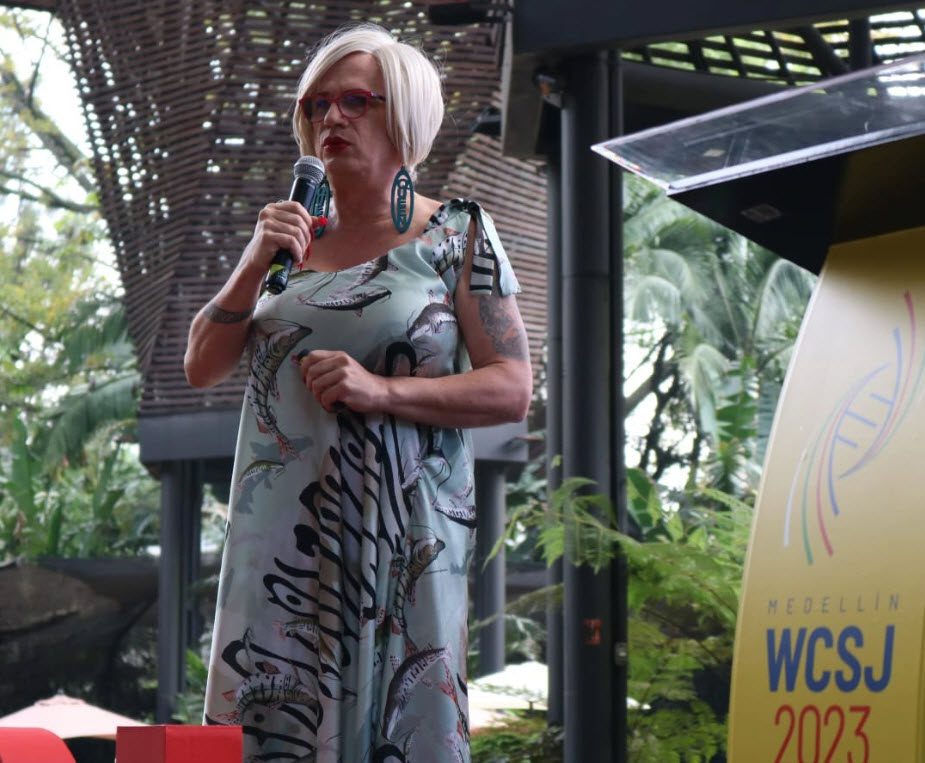by Mahima Jain, HJN Fellow at the World Conference of Science Journalists. This article originally appeared on May 8th in the media outlet Missing Perspectives.
In the biodiverse tropical gardens of Medellin, a call went out to all science journalists to deeply reflect on the politics of science, and science writing. As the 12th World Conference of Science Journalists (WCSJ) kicked off, Brigitte Baptiste, noted biologist and Chancellor of Universidad Ean in Colombia, challenged the global audience comprising writers and academics to ponder, “Whose biodiversity, who pays to tell the story, whose narrative, and who tells the story?”

The WCSJ took place from March 27 to 31 2023, at the Orquideorama Jardín Botánico–or the Botanical Gardens–in Medellin, Colombia. In the lush open air venue, with the Aburra Valley rising behind, the Baptiste’s keynote address set the tone for questions needed to be asked of all science disciplines, and the way science is communicated.
This set the tone for the panel discussions and plenaries that followed at the three-day long event. Close to 700 academics and journalists from over 50 countries registered to attend the conference to discuss science communication, climate change, disasters, biodiversity and indigenous knowledge, among other issues.
Journalists and science communicators from Colombia, Brazil, Mexico, Guatemala and other South American countries, as well as from Europe, Asia and the North Americas attended the event where panels were conducted in Spanish and English. The conference, organised by the World Federation of Science Journalists, was the first one to be held in the Global South with representation from several indigenous communities.
Panelists and participants tried to tackle the importance of indigenous and marginalised voices in science as well as science journalism, representation of varied marginalised groups in science, and the decolonization of knowledge. Here are four key takeaways that focussed on systematic exclusion:
Exclusion through dominant narratives
As Baptiste put it, “science is a privilege.” The recent recommendations of the Intergovernmental Panel for Climate Change (IPCC) are a case in point: can “global solutions” emerging from science practised by the Global North be suited for the Global South?
Baptiste asked: “Can we provide a common or shared understanding of the world’s biodiversity at global scale without imposing a narrative?”
Her advice to journalists and scientists alike was: Be careful about how you approach these issues (of science, biodiversity, deforestation).
Exclusion through caste discrimination
One could ask, for instance, how caste oppression in India affects science and scientists?
Award-winning science journalist Ankur Paliwal highlighted the systemic exclusion faced by marginalised caste groups in India’s elite science institutions. In a panel discussion titled “Reporting on inequity in science from the Global South,” he noted that less than 1% of professors come from these communities at the top-ranked institutes in India.
“‘There’s no one like me around me,’ that is what students of lowered castes told me through my reporting,” noted Paliwal, whose investigations on caste and science were published in Nature and Undark.
Paliwal’s key message was to increase inclusion, decrease inequality.
Exclusion through visa regimes
Visa regimes are another way of excluding voices from the Global South, said Abdullahi Tsanni, a freelance science journalist reporting on sub-Saharan Africa. For the British Medical Journal, Tsanni investigated how leading academics, activists and health professionals from Africa have not been able to attend global health conferences due to restrictive visa regimes.
“You can’t make decisions without us present,” said Tsanni, who was Paliwal’s co-panelist. He called the process of visa application “brutal” and a form of “harassment” with long delays often ending in rejections.
This was particularly relevant as several participants at the conference were unable to attend in person due to visa-related delays and rejections, often even for just a transit visa via Europe.
Exclusion through colonization of knowledge
Sashenka Hernández Estrada, an indigenous activist, psychologist and filmmaker from Mexico, has witnessed the extraction of resources and knowledge from her community. She pointed out that on the one hand, indigenous knowledge is not regarded seriously by the Global North, and on the other, it is used for commercial gains.
In a session titled “Science and Biopiracy of Indigenous Knowledge”, Estrada spoke about the centuries-long, never-ending process of colonisation of nature and knowledge.
Since the resources are in indigenous communities, they suffer from systematic exploitation even as their knowledge systems are not valued. Estrada and her co-panelists spoke about different forms of biopiracy, wherein naturally occurring biochemical or genetic material is exploited for commercial gains.
She highlighted issues with lack of informed consent while conducting research. On how these issues impact communities, she said, “The problem with biopiracy and exploitation of resources is that life itself has become an exploitable resource.”
Estrada’s passionate speech on the last day echoed what Baptiste said at the beginning of the conference: “Modern, post-extractive economies are challenging indigenous lives.” And it is the job of science and science journalism to question, debate and investigate this.